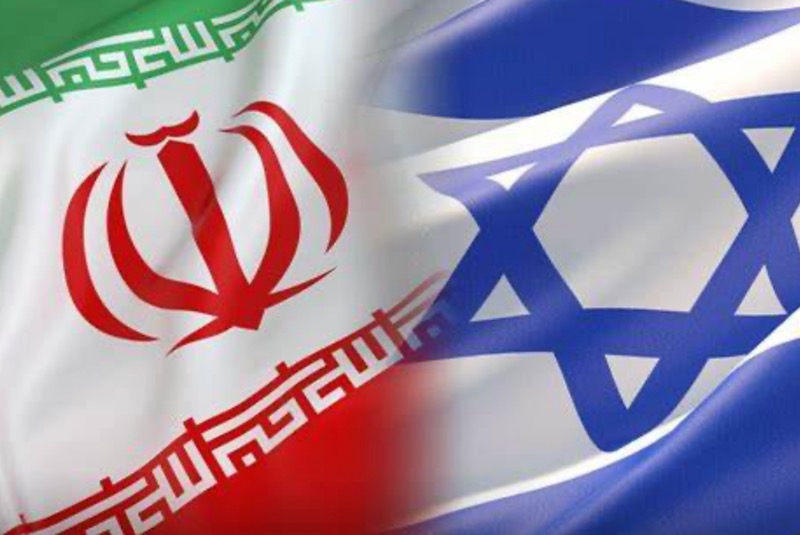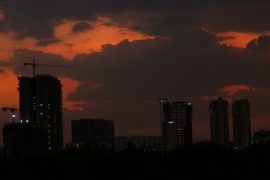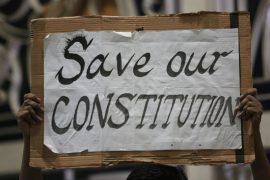On April 19, around 4 AM local time, Israel launched drones at Isfahan, 270 miles south of Tehran, in retaliation for Iran’s attack on Israel with over 300 drones, ballistic and cruise missiles. This could turn into a full-blown war, possibly triggering a nuclear war, with devastating consequences for the rest of the world. However, let us understand the big picture and look at the implications and consequences thereof.
The media pundits of the world characterised Iran’s attack on Israel on April 13 as ‘unprecedented.’ The last time any external power sent missiles to Israel was in 1991 when President Saddam Hussein of Iraq sent a few missiles at the beginning of the war started by Washington to liberate Kuwait. A full-scale attack on Israel was launched way back in 1973 by Egypt and other Arab states.
Since then, the IDF (Israeli Defence Forces) has built up a reputation for invincibility, enhanced by the fact Israel alone has nuclear weapons in the region. Israel has stuck to a policy of neither denying nor affirming its nuclear status. The Stockholm International Peace Research Institute (SIPRI) estimates that Israel has 90 nuclear weapons.
Israel has not announced any policy about the use of nuclear weapons. For example, India has announced a policy of ‘no first use.’ In the context of the ongoing genocidal war in Gaza, some Israeli politicians have publicly called for using nuclear weapons. A minister who did that was forced to resign. Since Israel currently has the most toxic right-wing government in its history, it is gratifying to see the minister resign.
But why did Iran resort to an ‘unprecedented’ attack on Israel?
When I was First Secretary in the Indian Embassy (1976-79), Iran, which was then ruled by Mohammed Reza Shah, had cordial relations with Israel. Israel had a de facto embassy in Tehran.
In 1979, the Shah fled the country, and Ayatollah Khomeini took over. Under his regime, Iran cut off relations with Israel and started pursuing its nuclear power programme with the potential to make weapons. The Shah had sent a letter of appointment to Raja Ramanna after the 1974 PNE(Peaceful Nuclear Explosion) known as Pokhran 1. Ramanna of course, was not interested in moving to Iran, and the copy of the letter of appointment came to us in the Embassy.
However, during the Iran-Iraq war (1980-1988), Iran asked Israel for weapons, which the latter supplied. Moreover, Israel prompted Iran to bomb the Iraqi nuclear facility at Osirak. But, Iran failed to hit the target. Using intelligence supplied by Iran, Israel bombed the nuclear facility.
Interestingly, during and after the war, Iran officially denied receiving arms from Israel, which it referred to as an ‘illegitimate state.’ Furthermore, in 2000, Ayatollah Ali Khamenei called Israel a ‘cancerous tumour’ that had to be taken out. Since then, the hostility between the two has remained, and we do not know of any secret deals between them.
When the United States, under President Obama, tried to conclude a nuclear deal with Iran, called the Joint Common Plan Of Action (JCPOA), Israel tried hard to stop the deal from going ahead. However, it failed; the United States, along with others, and Iran signed the deal in 2015.
Israel has been killing Iran’s nuclear scientists and Islamic Revolutionary Guard Corps (IRGC) for many years. Between 2005 and 2020, Israel targeted and killed six nuclear scientists. Since October 7, 2023, IDF has killed as many as 18 IRGC officers.
When Israel bombarded an Iranian consulate in Damascus, killing several high-level military officials, Iran decided that unless it hit back, Israel’s killing spree would continue. Hence, the attack on Israel on April 13.
Israel was publicly advised by Washington and the rest of the West to exercise restraint. Biden said that Israel had successfully defended itself by intercepting 99 per cent of the drones and missiles. The US, UK, Jordan, and France used their forces in the region to intercept Iranian missiles and drones.
Israel’s famous Iron Dome and Arrow 3, a multi-layered air defence system, worked well. Therefore, Biden publicly declared that there was no need to retaliate. It has been announced that Israel had told Washington in advance of its plans to send missiles and drones to Iran.
It should be noted that Israel has played its cards cleverly. Initially, Israel asked the West to tighten the sanctions on Iran. The U S Treasury Secretary has announced sanctions to ‘degrade’ Iran’s capacity to make missiles. The EU has also announced its plans to tighten sanctions. The UK has already replicated what Washington has done. Israel struck only after the sanctions were announced.
There is another aspect that deserves notice. The UK Foreign Secretary, Lord Cameron, who went to meet Netanyahu ostensibly to prevent a regional conflagration pursuant to Israel’s retaliation, showed due humility when he said it was for Israel to decide. This humility is seen in Biden, too. However, only recently, when IDF killed seven staff members of the World Central Kitchen, Biden spoke, showing anger.
Netanyahu responded by opening more points of entry for humanitarian aid. Biden did not dare to tell Netanyahu that Washington might stop or impose conditions on weapons it supplies, without which the IDF cannot continue the genocidal war.
In this context, it is useful to recall that in 1982, President Raegan made Prime Minister Menahim Begin stop the bombing of Beirut with a brief telephone call. The death toll was in the hundreds, but Raegan demanded Begin to stop the ‘Holocaust’ ‘right now.’ It is painfully clear that Biden, who lacks the ability to exercise the presidential authority that Raegan had, is aiding and abetting Israel in waging its genocidal war in Gaza.
What are the likely implications and consequences of Israel’s aggression against Iran? Iran has decided to de-escalate the situation. Its media have downplayed the attack. President Ebrahim Raisi, in his first public address, did not mention a word about Israel’s attack. The government-controlled media has also not mentioned Israel. Iran has officially told Reuters that it was not planning a tit-for-tat response. Speaking to a news agency, an Iranian official said:
The foreign source of the incident has not been confirmed. We have not received any external attack, and the discussion leans more towards infiltration than attack.” [Italics added]
However, we cannot be sure that Israel will restrain itself. The extremists in the cabinet are upset that Netanyahu, ‘cowed down by a hostile Joe Biden,’ failed to hit back at Iran in a manner that would set fire to the whole region. They hold that, with a big war, they could have settlers in Gaza and increase their number in the West Bank.
Before the strike occurred, Iran was worried that Israel was going to strike at Iran’s nuclear sites. ‘The threats of the Zionist regime against Iran’s nuclear facilities make it possible to revise our nuclear doctrine and deviate from our previous considerations,’ Ahmad Haghtalab, the Guards commander in charge of nuclear security, was quoted as saying by the semi-official Tasnim news agency.
We may note that Haghtalab spoke the day before Israel struck. The key question is: Is Iran likely to revise its policy decision not to make nuclear weapons? We can only speculate. If Iran decides to go nuclear, we cannot be sure that it will publicly announce the change. As of now, Israel lacks the military capability to destroy Iran’s nuclear facilities. The Fordow Fuel Enrichment Plant is 80 to 90 meters under the rocks, and the IDF cannot destroy it. If Iran goes nuclear, Saudi Arabia might follow, and Israel’s security will be diminished significantly.
There is another geopolitical development that is taking place. With the never-ending sanctions from the West, Iran has got closer economically and militarily with Russia and China. Iran has supplied drones to Russia for use in its war with Ukraine. President Xi Jinping, who visited Iran in 2016, signed an agreement with Iran to invest $400 billion over a period of 25 years. China has been a major buyer of oil from Iran despite U S sanctions. In short, a Russia-China-Iran axis is in place. Biden’s policies have, perhaps unwittingly, strengthened the axis.
Any escalation between Israel and Iran will have disastrous consequences for the two, the region, and the rest of the world, including India. If the oil prices soar, India importing 85 per cent of its consumption will be hit hard. We do not know how many Indians are in Israel. The Embassy of India in Israel has about 18,000 on its register. However, many have not bothered to register. India has stopped Israel from recruiting workers from India. Given the prospect of a full-scale war, Indian nationals might have to be evacuated.
President Biden’s re-election chances will be adversely affected by war between Iran and Israel. President Zelensky might be praying hard for de-escalation as he watched with pain how the US and UK rushed to Israel’s rescue by intercepting drones and missiles while his request for air defence remains unanswered.
-30-
Copyright©Madras Courier, All Rights Reserved. You may share using our article tools. Please don't cut articles from madrascourier.com and redistribute by email, post to the web, mobile phone or social media.Please send in your feed back and comments to [email protected]











